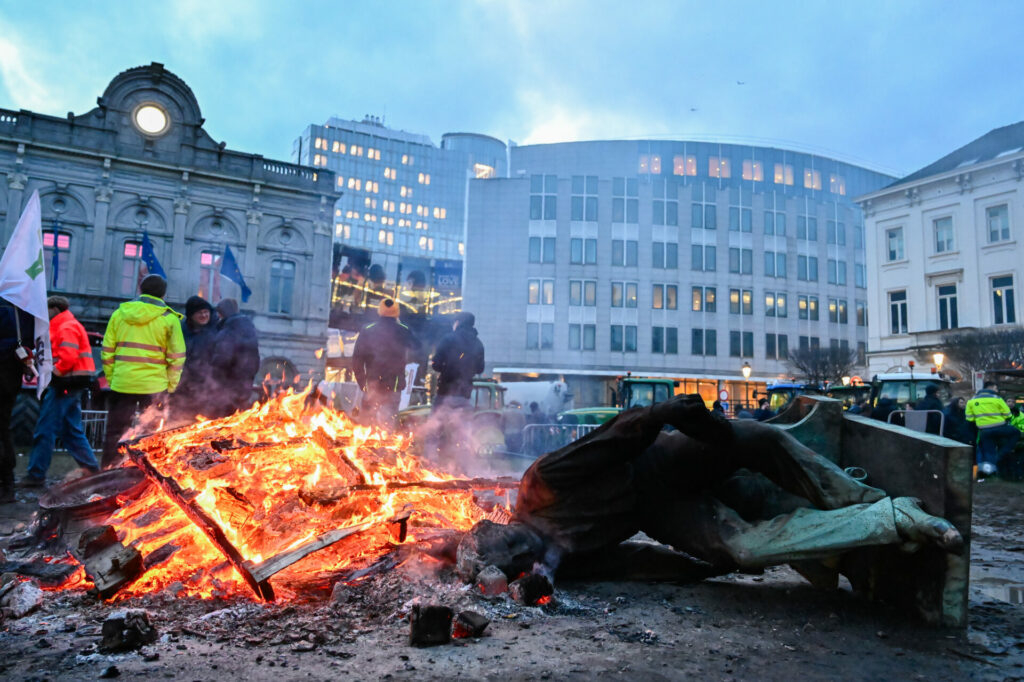The farmer protests in Brussels during the European Council meeting on Thursday disturbed the sleep, disrupted traffic, blocked roads, and obstructed food deliveries to super markets. EU leaders met the protestors and tried to meet some of their demands.
The farmers were angry with EU’s common agricultural policy (CAP) and felt that they had been left behind in their incomes and are weighing down administrative burdens and excessive regulations. The protests were described as sometimes grim but overall peaceful although in some places they turned into clashes with the police as seen in the photos.
During the protests, on Wednesday, the European Commission proposed postponing the requirement to leave 4% of arable land fallow each year and imposing restrictions on imports of poultry, eggs and sugar from Ukraine.
As already reported, despite meeting with EU leaders and the Belgian Prime-Minister after the summit, agriculture representatives were dissatisfied by the response to their demands.
"No progress has been made. Now we will block the country," a union representative threatened. Farmers call for free trade agreements to be cancelled and administrative burdens to be reduced. They denounce new environmental standards and demand a fair price for their products. Some of their grievancies seem to be linked to domestic Belgian issues.
In a statement on Thursday, the WWF European policy office agreed that farmers need fair prices but warned against rolling back environmental reforms in agriculture. “Farmers are asking for fair rewards for producing our food, and they are right,” commented Giulia Riedo, Sustainable Farming Policy Officer.
“The European Commission and Member States must focus on these very real concerns and address fair prices by fully implementing the Unfair Trade Practices Directive, ensuring that farmers who farm sustainably receive more funds and requiring food processors and retailers to play their part in improving the sustainability of the food sector.”
Fair prices by redistribution of aid
The CAP accounts for one third of EU’s total budget so that there should be enough money to safeguard the incomes of the farmers. The problem is rather the uneven distribution of the EU financial aid to agriculture.
“20% of the largest European farmers, often large-scale industrial agri businesses, receive 80% of direct payments, while most farmers (often family farms) on small or medium-sized farms receive little to nothing,” according to WWF. The problem is well-known but has not been adequately addressed until now.
Rolling back on the biodiversity measure is not recommended. The measure which requires farmers to leave 4% of their land for nature conservation means that they cannot grow crops or use pesticides on this land. This measure encourages pollinators and natural predators that control pests, helps protect farmland from floods and drought by storing water in the land, and helps prevent soil erosion.
In her opening remarks at the press conference after the summit, European Commission President Ursula von der Leyen thanked the farmers for their role in Europe’s economy and society and their contribution to its food security.
“Farmers can count on European support,” she said. “The Common Agricultural Policy budget allocates close to €390 billion, that is almost one-third of the European budget, to agriculture. In 2023 alone, Europe provided exceptional assistance of over €500 million to farmers most affected by crises. We know that this support is crucial, and we know that farmers are making good use of it.”
Measures in the short and long-term
She also announced a new proposal to reduce the administrative burden. “This is a general topic, you know that this is close to my heart, to reduce these administrative burdens. So, we will work with the Belgian Presidency on a proposal that we will then present ready in time before the next Agricultural Council to work on reducing these administrative burdens.”
She also recalled the recent launch of the Strategic Dialogue on the Future of Agriculture in the EU. The aim of this new forum is to shape a shared vision for the future of the EU's farming and food system.
“The strategic dialogue will also bring answers in the mid and long term, that will feed in the programme of the next Commission, and certainly will have an influence on the next negotiations on the CAP,“ she said.
A number of working groups will be organized in the framework of the dialogue to discuss specific problems or themes, such as farmers’ incomes and support to agriculture “within the boundaries of our planet and its ecosystem”. Farmers and their organisations are well represented in the dialogue. The final report is expected by September.
Will the upcoming proposal on reducing the administrative burden preempt the discussions in the strategic dialogue on economic and environmental sustainability in agriculture? “There is absolutely no contradiction,” the chief spokesperson of the Commission replied on Friday.
We are looking at the administrative burden in the current context and CAP, he explained. The strategic dialogue should be seen in a mid – and long-term perspective, setting out a new vision for agriculture while keeping together the goals of fighting climate change and protection nature with the essential role played by agriculture.
M. Apelblat
The Brussels Times

